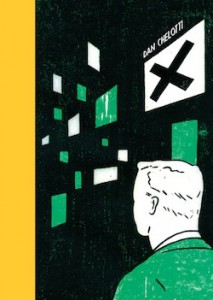X by Dan Chelotti
 X
X
by Dan Chelotti
McSweeney’s, 2013
82 pages / $20 Buy from McSweeney’s or Amazon
Equidistance is a matter of perspective. The Say It with Writing salon where I found Dan Chelotti’s debut poetry collection X is located midway between the rising North Avenue Arts District and Baltimore’s shabbily-mortared potter’s cemetery. Chelotti’s row house poetry is right at home between art and death. Short, but with a long back; and bald, but with a yarmulke of hair on his crown, the round-faced Chelotti is also a greedy one for transition words: I was thinking this, but then that happened. Welcome to the X. It’s what horse people call a cross, and what Italian horse people call a cavaletti. It’s the Bowie Knife mark you cut to suck the venom from a snake bite. It’s the way you remember where you buried those doubloons. It’s the man who preached about getting active against a context that won’t budge.
Like an associative poet, Chelotti uses more images than statements, but two thirds into most of his poems he places a hinged joint, a transition, and he uses very different associations to get out of the poem. “Thoughts over Foreign Sandwich” begins with a Swedish uncle cooing over the speaker. The speaker identifies with the “elderly contortionist” and wonders if he could have a new name, a Swedish name, “I would be Per. / And being Per, I would / adore calculus.” At the point where the poem is almost becoming too precious, Chelotti bangs us with his transition: “But dammit, / I don’t love calculus, / I don’t even know / what calculus is.” The poem argues against mere concepts, “My desk is a trap / into which I fall— / hands first” in favor of something more sensual.
Chelotti’s hinges are subtle. Most of his transitions would be lost in poems with stanza breaks, which may explain why he doesn’t have any. X contains sixty-two poems on seventy-nine pages without a single instance of “meanwhile, back at the ranch” or “let me come at this again” which a new stanza offers. Chelotti doesn’t even put his poems into sections so that the reader has a place to rest and absorb the arcs. Why? Because there are no arcs. These poems are one endless link of boxcars on a train that doesn’t have a whistle or a peg of rust. Chelotti’s writing is clean and tidy enough to pull this off. Consider the opening third of “Augury”:
been there to point out
the axles of my carousels,
to let the dead know
what I’m up to.
Take the day
I stuffed my car with boxes.
I was very sad. I thought,
if only someone could
remind me how to feel.
I got in, started to drive
and a swallow flew
off the back of my head.
Here, Chelotti wrestles with old adversaries—intellect and emotion—before finding his way to an irrational, but believable conclusion. The pace is slowed down; he doesn’t like to get out of second gear in any of these poems so that in spite of each poem feeling like a tiny apartment the reader isn’t constantly fiddling with his oxygen tank to get more air.
June 21st, 2013 / 11:00 am
